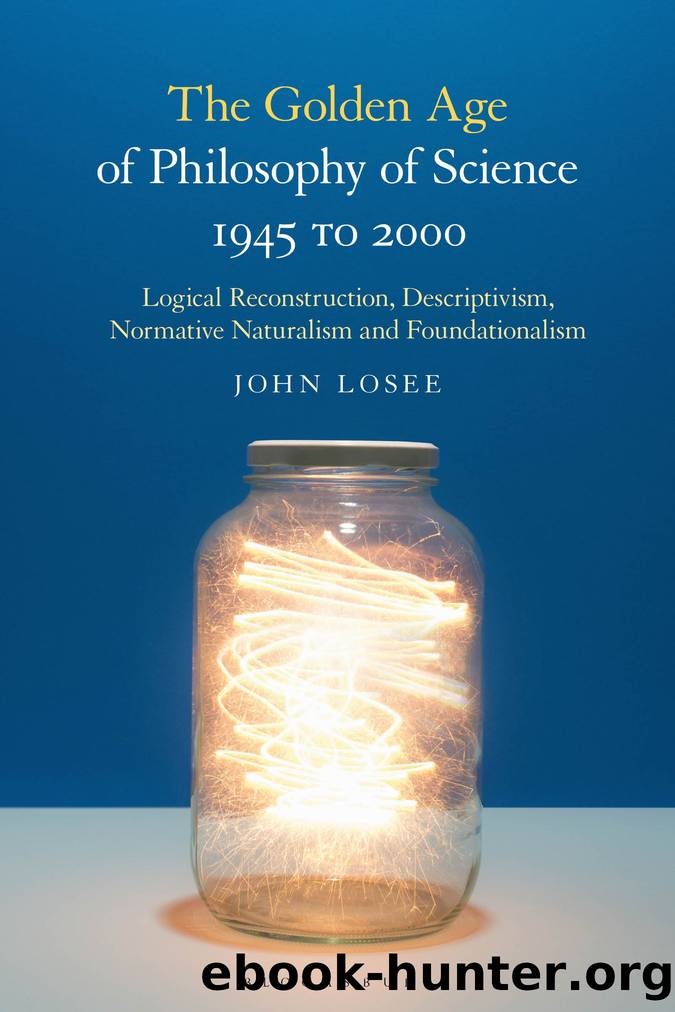The Golden Age of Philosophy of Science 1945 to 2000 by John Losee;

Author:John Losee; [Losee, John]
Language: eng
Format: epub
ISBN: 9781350071537
Publisher: Bloomsbury UK
Published: 2018-10-23T00:00:00+00:00
Meehlâs âActuarialâ Approach
Paul Meehl has promoted an âactuarialâ approach to philosophy of science. He observed that philosophers of science agree that there are several, sometimes conflicting, standards for the appraisal of scientific theories. Among these standards are simplicity, agreement with observations, breadth of scope and predictive novelty. Unfortunately, we have only sparse data on the relation between the fate of individual scientific theories and the presence or absence of these factors. Meehl recommended the accumulation of the appropriate data for randomly selected theories, and the subsequent appraisal of this data by the techniques of statistical analysis.
Meehl thus outlined a program for future research. He contrasted his âactuarialâ program with the âsubjective, impressionisticâ1 appraisals of those philosophers of science who draw conclusions about evaluative practice from selected case studies. Whether or not evaluative situations in science are amenable to the sort of statistical analysis Meehl proposes remains to be shown. The actuarial approach assumes that theories can be individuated, and that the evaluative histories of theories Tm and Tn are equally important. Both assumptions are subject to challenge. But the recommendation to accumulate additional data on evaluative practice in science is sound.
Meehl took philosophy of science to be something more than the description and statistical analysis of actual practice. He subscribed to the robust version of descriptive philosophy of science. In its ârobustâ version, descriptive philosophy of science is a âscience of science.â As such, it is a discipline distinct from the history of science and the sociology of science. Meehl declared that the philosopher of science ought seek to explain the phenomena of the domain. The goal should be to understand why science âworks,â not merely to ascertain the empirical correlates of its working well or badly.2 Meehl thus introduced the methodological equivalent of the relationship between phenomenological laws (e.g., Boyleâs Law) and theories about underlying mechanisms (e.g., the kinetic theory of gases). Application of the actuarial program uncovers the phenomenological laws of evaluative practice. The philosopher of science then develops a theory about the underlying mechanism, thereby explaining âwhy science âworks.ââ Meehl observed that since the âphenomenological lawsâ have not yet been uncovered, it would be premature to put forward a theory of science.
Download
This site does not store any files on its server. We only index and link to content provided by other sites. Please contact the content providers to delete copyright contents if any and email us, we'll remove relevant links or contents immediately.
The remains of the day by Kazuo Ishiguro(8389)
Tools of Titans by Timothy Ferriss(7810)
Giovanni's Room by James Baldwin(6808)
The Black Swan by Nassim Nicholas Taleb(6762)
Inner Engineering: A Yogi's Guide to Joy by Sadhguru(6440)
The Way of Zen by Alan W. Watts(6288)
Asking the Right Questions: A Guide to Critical Thinking by M. Neil Browne & Stuart M. Keeley(5355)
The Power of Now: A Guide to Spiritual Enlightenment by Eckhart Tolle(5331)
The Six Wives Of Henry VIII (WOMEN IN HISTORY) by Fraser Antonia(5235)
Astrophysics for People in a Hurry by Neil DeGrasse Tyson(5000)
12 Rules for Life by Jordan B. Peterson(4160)
Housekeeping by Marilynne Robinson(4059)
The Ethical Slut by Janet W. Hardy(4036)
Skin in the Game by Nassim Nicholas Taleb(3965)
Double Down (Diary of a Wimpy Kid Book 11) by Jeff Kinney(3924)
Ikigai by Héctor García & Francesc Miralles(3889)
The Art of Happiness by The Dalai Lama(3844)
Skin in the Game: Hidden Asymmetries in Daily Life by Nassim Nicholas Taleb(3720)
Walking by Henry David Thoreau(3681)
